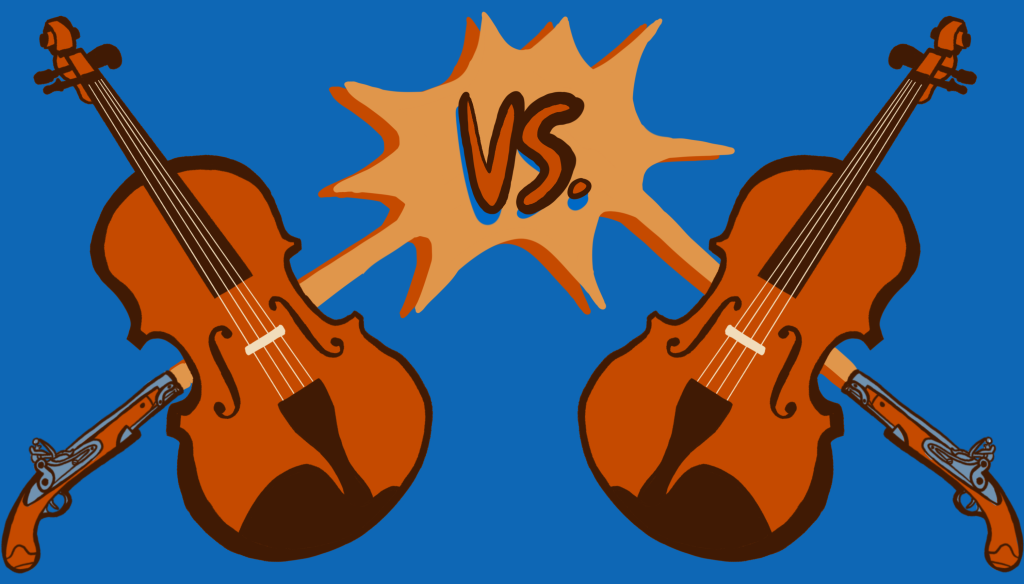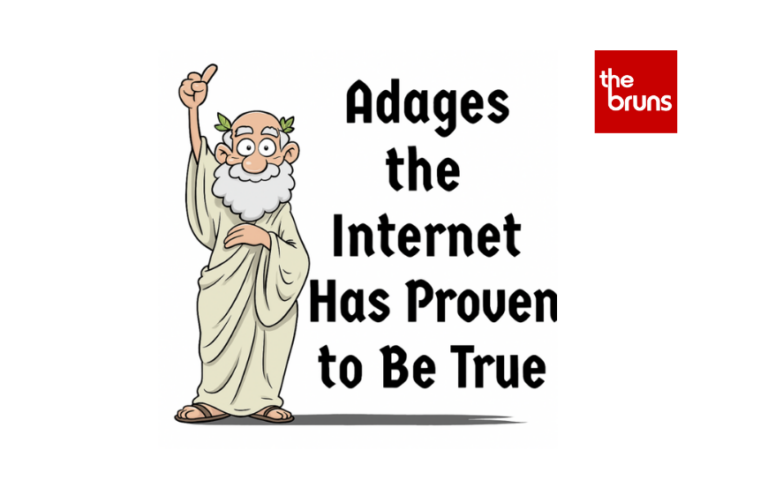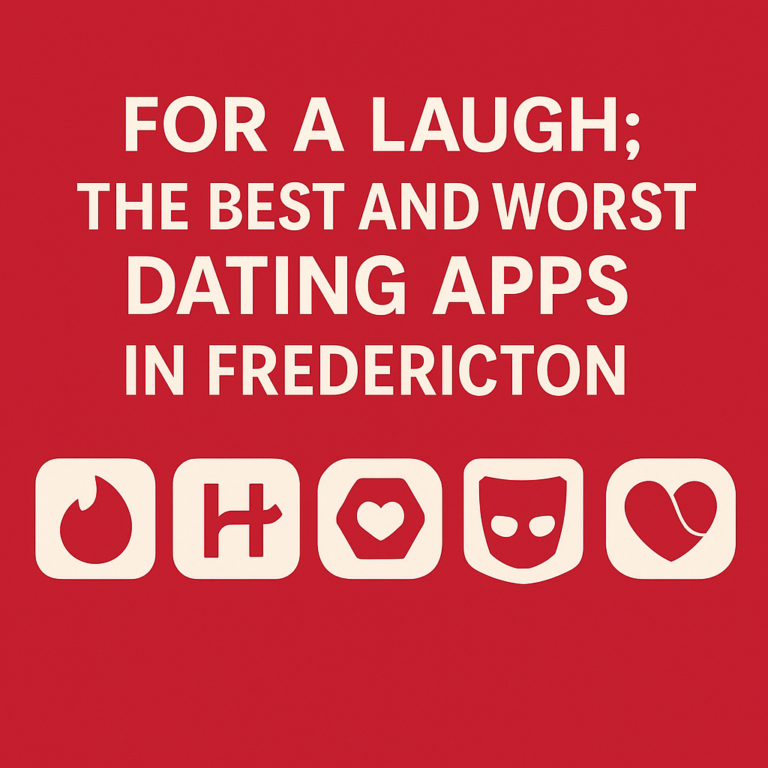It is September 1821 and an innocent man has been arrested in Gagetown, New Brunswick. The courtroom is poised and volatile, efficiently fracturing the reputations of two sparring attorneys. Relentlessly dignified, one attorney challenges the other to a duel – illegal and definitively honour-restoring. Pistols are bared on Maryland Hill in October 1821. One attorney bleeds to death; the other, moral character purified, becomes a fugitive. He eventually stands trial and, surprisingly, is granted a normal life.
October 2021 marks the event’s 200th anniversary.
Fredericton composer Zachary Greer, allured by the cinematic quality of the story, interprets the emotional turmoil of the attorneys in his album The Duel. The eleven scores are chronologically ordered, building the characters’ emotionalities linearly through seething and contemplative string-instrument prose.
Violin-prone, I listened to the scores on repeat, their themes lucid, versatile, slow yet unpredictable. Arching violins suddenly stop, screech, veer in new directions; foreboding guitar plucks foreshadow liltingly; soft trickles of piano collapse off the ends of angry violins that plateau to mourning. Amidst the evident emotional complexity, the album also contains gentle, nostalgic segments that anchor the listener to the rustic physical setting of old New Brunswick.
I had the pleasure of speaking with Zachary Greer about The Duel. My questions addressed Greer’s interpretation of the characters’ emotions and the associated instrumentation choices; the innate ability of string instruments to express raw emotion; and the idea that musical renditions of emotions retain core melodic similarities through time.
“I really wanted to focus on the idea that… people can be pushed to do certain things depending on what it is they’re trying to protect. Very timeless trope of people, seen in lots of different stories, movies, TV. The darker sides that people can go to when they’re put in situations, pushed to do those things. I think that’s what makes stories a little more fulfilling: when you have characters that want redemption and closure in some way. You have nice contrast,” he shared. “I think some of the tracks dive a lot more into the psychological and the emotional aspects, and then, because my background is so much brewed in film music, that’s… my inspiration, some of the tracks are almost intentionally scene transitions into the next track. You have one track that really focuses on the characters and the next track is more like a breather. It’s taking some time to transition to another setting.”
I asked whether he had clear melodic pictures in mind before beginning the writing process, or if he had idea “fragments” that naturally elongated as he wrote.
“Sometimes… I do have a very clear idea. But other times when you have an idea it is very nice to go wherever you intuitively feel like it should go, or if it’s taking you somewhere else. It can be kind of surprising either way. But if you have a very clear idea – I [still] tend to experiment when there’s room to, and go in different ways,” he said. “Honestly, I had this idea – the main themes of the album – written [and] recorded on my phone on guitar over a year before I had the opportunity to do this project. And reading [the duel] story, I thought about that theme and I thought: ‘oh that could really fit for this story and I can really elaborate on that and take this idea further.’”
This was interesting to hear; I had pondered whether, artistically, the story of the duel served as a context for the music, or the music a context for the duel. Greer elaborated on this:
“I focused a lot on the characters and the narrative because that’s where I can… draw the inspiration to write the music. But at the same time, the actual act of… the duel was part of what gave The Duel another type of energy to the music. If it was a different [context] still focused on the same emotions there would be some changes with the music, some similar elements, but it would be a combination of both,” setting and emotions.
Extrapolating on this, I asked how the structure of the music would change if the duel had taken place in a modern setting. Would the social norms that bound emotional expression affect the music, despite the emotions themselves being timeless?
“The Social Network is about Facebook and stuff, and it has a much more electronically-driven score which is reflective of the growing technology today. So the choice of the instrumentation is definitely meant to be connected to the period and the time, but… I like very organic strings and instruments like that. I think the music… would be interesting in a modern setting if that was the situation. I think the music would still have characteristics that play through and connect [independently]. If you took all the music in this album and didn’t change the harmonies… and you just changed the instrumentation, it would definitely… with a few tweaks, still resonate and create and give off the same emotions, the same types of themes coming across,” he said. “The harmonic aspects of the music and the main [theme] that is reused throughout the album… had a lot of weight to it. So that pressure, the guilt, all those things have a lot of emotional weight. So the motif really pulls right down towards the ground. I think that aspect of it would still translate even in a modern setting.”
In his promotional reel, Greer stated that he craved a, “very raw and intimate sound” for the album, which was supplied by the musicians he worked with – duo Pallmer, and musician Ali Johnson. But he didn’t mention specific instruments in his description; I reflexively imagined that it must involve violins. I was pleased that it did, but asked Greer to comment on the tendency of stringed instruments to be associated with intense emotions. Are there some instruments that naturally have larger emotional ranges than others, solely due to their timbre?
“It’s a good question. I can’t say for sure. I can’t speak for other people on how they respond emotionally to strings. I know for me personally – and yes you’re right, the raw sound, associating that with violin, one hundred percent… because that is what I would think of, too. And when I wanted that sound that is what I wanted: individual solo strings and very organic [sound]. I wanted to really hear some of the imperfections in the sound, too. I didn’t want it to sound too perfect. I don’t know that everyone would have that association [with the violin]. That’s the thing about music, people’s backgrounds… might associate [it with] different things,” said Greer.
“If I was being biased, I would say that there is definitely something human about strings that does hit everybody in an emotional way,” he said. “People may not even be conscious of it but I think that the way that strings sound, there is something about them. I’ve read in books that the cello is one of the closest instruments to the human voice. Some people have even said that about the viola as well… I think the cello may be more so because of the range of the cello. But it’s so hard. Because music is such a weird thing where you can have [music against] a scene in a movie, or against a painting, or against something completely different, and it takes on a whole other set of emotions and it’s kind of crazy.”
He elaborated on the use of violin in the album:
“I did want to experiment a little bit with some slightly more contemporary articulations and playing styles with the instruments. So in [the track] Nowhere to Hide, the violin uses the bow on the wood, and that creates very nice overtone screeches and then it will come back down. It’s very unpredictable. So that was something I wanted to experiment with. And then that also plays onto the human emotion there, too, all the inner thoughts that both characters would have. Specifically [the track] Battling The Pride, in terms of the narrative. That’s after the two have both gotten into their heated argument. They end up having a brawl in the street in front of the courthouse, and then basically that [track] is them playing back the scenario in their heads, so they’re back and forth between being upset [and] trying to decide what to do… There’s meant to be a feeling of pacing back and forth.”
He concluded his thoughts about the fatal event on a sad note:
“Personally, from my interpretation of it, I don’t necessarily think either one of them really wanted to do [the duel]. I think that they just felt like at that point there was no going back on it. I don’t really think that either one of them really wanted to do it in the end.”
For those interested in listening to The Duel, visit: https://zacharygreer.bandcamp.com/album/the-duel
To learn more about the story of the duel, visit: https://www.vonm.ca/living/the-street-wetmore-duel/




